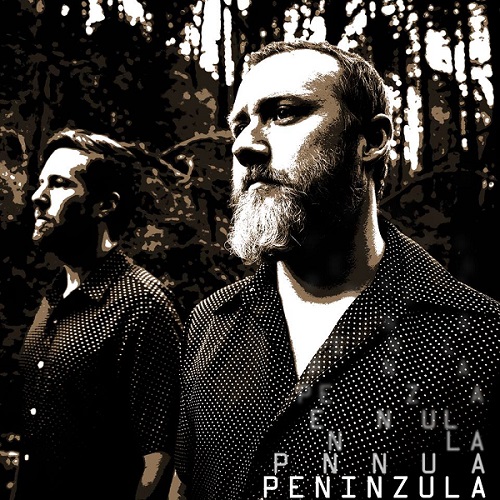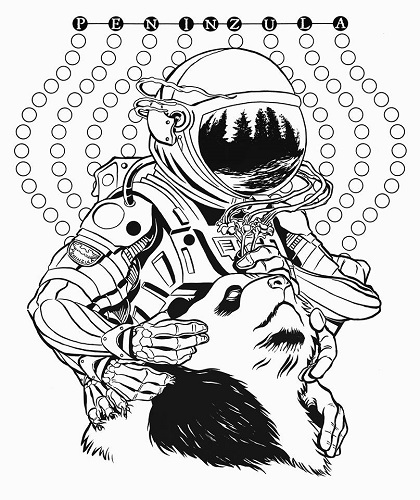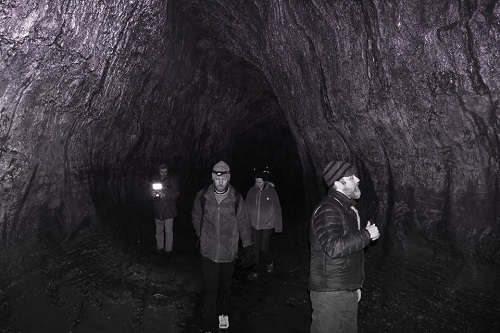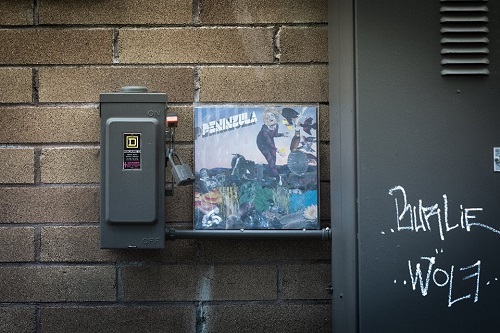
Peninzula is an aural interpretation of a journey, each image rewritten as sound. It’s members are currently on a pilgrimage to weave these experiences together into a new tapestry for listeners to wrap themselves in. Andy and Jonathan are currently traveling across the United States, and I caught them halfway on their quest to conceive their newest brainchild.
Who is Peninzula? How did this project come into existence?
Andy: I’m riding on a train through middle-of-nowhere Washington under an orange Waking Crescent moon. I quit both of my jobs in Portland and am traveling to balmy Greensboro, North Carolina. The driving force behind this quest has been “Peninzula.”
Jon and I met through my cousin Rob in Michigan as teenagers. We ended up going to the same college and just occasionally talking music, smoking, and hanging out. It wasn’t until years later that Jon would surprise me at a show a fomer band was playing in Greensboro, his new home -of all places- that we would link up again. Jon showed me his latest project with music with songs that were happy And eerie, basic yet nuanced. I was intrigued. The packaging was cryptic and it was all instrumental; any time that we jammed, Jon usually sang. He started focusing more on piano and synth parts that I really wanted to play drums with. I was living just a couple hours west of him and we would rehearse when we could on weekends. We were excited about what we’d come up with and hit the studio running. A few days to track, lay down mostly first takes, add some intros and outros (the intro on Discokraut required a reel-to-reel tape machine screeching out department store chatter in Japanese.) All of this was Jon’s vision, I just hoped to accompany this oddly beautiful stuff with some drums and percussion. Since then, I’d been working in Portland and mercilessly promoting the first album until we were able to get into the studio again.
We’re set to record the second Peninzula album in just a few weeks thanks to a month-long fundraising campaign.
Tell me about the sound of Peninzula. What is the inspiration or force behind it? Is there a particular influence that helped shape it’s sound and atmosphere?
Andy: Influences during the songwriting process ranged from the krautrock movement of the late 60s – early 70s to the downtempo subculture happening today. Each song has its own baggage, too, such as “Mt St Helens,” inspired by said volcano erupting on the day Jon was born. “Stratos” was written on the underrated Omnichord, an early 80s electronic instrument that Suzuki made. Jon writes the songs on piano or keyboard and we go from there. Where I come in is by practicing one version of each drum part with bass, one with guitar, one with synth, and then we go with the best feeling combination after beating the songs to death, albeit a fun and creative slaying. Also Jon really likes horror movie soundtracks. Listening to them is addictive, I’ve gotten into indie electronic horror soundtrack music on SoundCloud lately…our first album was pretty scattered and we intended it to be.

Peninzula seems to be inspired by local landscapes as well, from what I can see in your videos. For example, songs like “Mount St. Helens” and the Pacific Northwest imagery and visuals you employ. What would be the Peninzula guide to Oregon?
Andy: Actually, I have only lived in Oregon for just under a year and Jon has always lived in Michigan or North Carolina, where he lives and writes now. When “Mt St Helens” was written we had no idea that after we released the album, started promoting and shooting music videos, that I would be in the Northwest US. We also didn’t know that Jon would be able to come visit from the other side of the US to record the video on location at Mt. St. Helens! Imagery is important with our music, I think, because without words, layered melodies and rhythms are responsible for communication with the listener’s emotions. Not that we’re attempting to get into anyone’s head, but I hope that there is some connection with the listener and the music is intended to accompany landscapes near and far.
Right now, as we’re conducting this interview, you are traveling across the United States to record your second album. You are gathering quite a collection of landscapes and experiences. Are you traveling by land to gather more inspiration for your new album?
Andy: Absolutely. Pictures, memoirs, free writing, and even my mini synth effects pad along the Great Northern Railway. Beauty amongst the suffering, hope rolled into feelings of distrust for this struggling nation. This trip nearly didn’t happen, but things have aligned, once again, better than expected.
Tell us a bit about the sound of the new album. How will it compare to the first?
Jonathan: I wrote most of the new material on my electric piano. The first album was written with guitar, bass, and piano. I would use those instruments to write different parts. The new songs all came from me sitting behind the piano. The first track is called Ziggarut. It is a piano arpeggio with my right hand and my left hand plays the bass line. I have a guitar part that I will track out on top. I also will be going in and putting synthesizers on top of all of the songs. It adds a lot of texture to the music. I have a collection of about 25 old synthesizers. I wrote patches on them and will incorporate them in the mix.

This album will be made possible through crowdfunding. For many independent artists, meeting the costs to release new material is a huge challenge, and has often led to frustration and giving up the pursuit of their dream. Even bigger independent musicians have turned to crowdfunding because it’s increasingly difficult to put out new material in these times. Is crowdfunding a game-changer for musicians? Will it evolve into the new norm for artists to create and market their new releases?
Andy: I know that these are difficult times for artists of all types and the solutions to these problems are not easy to answer. The money we have raised, $1,000, does help but to be clear it does not even begin to cover the expenses of making a studio album: equipment, transportation, recording production costs: studio, track mixing and audio mastering costs. At that point you have created, planned, and recorded your art, now to let it be heard: even if you are not going to physically release your music (CDs, records, tapes and their packaging) or have any merchandise (t-shirts, stickers and so on) you still have to digitally distribute your music. That requires copious amounts of time and/or money to see any kind of return on your investment. The first Peninzula album (self-titled “Peninzula” album) was funded out-of-pocket and our new album will be too, for the most part. The difference this time is that we know that we have some audience support and a little money to get us started (and to give us motivation and inspiration to continue creating). So, in my personal opinion, record labels were originally established for a reason: musicians who are inspired to craft and perform music tend to be sensitive people and that doesn’t usually mix well with the difficult tasks required for doing business, especially with in current economy. Being a DIY musician is a difficult job, but if you are doing it for pleasure, as a side-project or “hobby,” then it is easier to justify all of the time, persistence and energy that is required to release quality music to the world.
Crowdfunding is not a game-changer, from my perspective, it is just a temporary means to an end for motivated independent artists. Established artists are able to raise much larger amounts of money through crowdfunding due to an established fan base, which has already required tons of time and money (usually by an actual record label with qualified professionals who have done much of the leg work) in a previously more lucrative market. I sure hope that this is not the future for artists releasing music, unless tax incentives for small businesses are made more accessible. To end on a more positive note, if you believe in what you are creating and know that it makes even a small positive impact on the world around you, then keep doing it no matter what anyone says. You will always find a way to release your art with much patience and persistence.
What does the future hold for Peninzula? What are your plans after the album release?
Andy: Playing a concert series on Mars (haha, planet Earth is doing fine…) but before that, we may actually consider playing a string of live shows in the Southeastern U.S. and see how that goes. Live performance was not in any way part of our original plan as a recording project, due to obvious reasons involved with being aging musicians, but after the warm feedback from our debut album, and the great feedback for songs like “Atma Sutra,” “Waking the Giants” and “Discokraut,” we’ve begun to discuss and consider it. Having three Peninzula albums released by 2018 would be excellent. Also, there are still remixes of “Stratos” (illanthropy is the DJ name) and versions of a couple of other songs being re-released with vocals!
Thank you for your time and we look forward to listening to your new offering.
